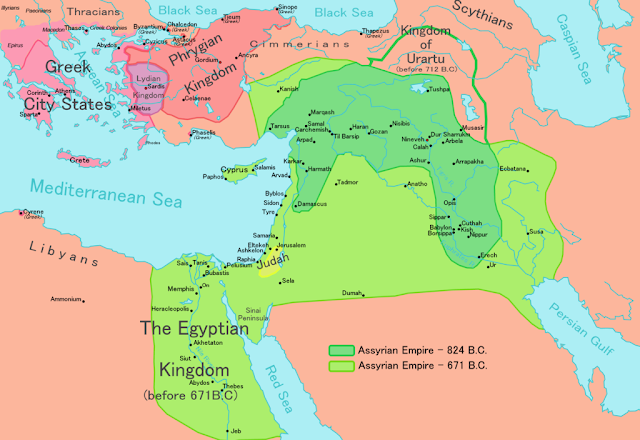 |
| Wikipedia, Map of the Neo Assyrian Empire and its expansions |
A note on the shift between Chapter 12 and 13 from BKC:
A major break occurs between Isa_12:1-6 and Isa_13:1-22, but not as major as some interpreters have suggested. Even in chapters 13-23 Isaiah reiterated some of the same themes he voiced earlier: God uses various means to punish sin, and will judge those nations who are arrogant against His covenant people. These messages against nine sinful Gentile nations or cities around Judah were probably not written for them to read. The messages were probably to be read by God’s covenant people to show that God actually will judge Israel’s enemies. This would reassure Judah that God will establish His kingdom. -Bible Knowledge Commentary1. Who will be the Lord's "consecrated ones," and His "instruments of indignation"(13:5) against Babylon? Give the verse.
God's army (v 3) This has an immediate and future fulfillment. Armies were drawn from various places near and far. This will happen again immediately before the Millennial Kingdom.
"They come from a distant land, from the end of the heavens" Isaiah 13:5
BB says immediate fulfillment was Babylon conquered by Medes & Persians in 539 BC. The gates they enter are Babylon's.
The Medes (v 17)
2. What does "consecrated" mean?
According to Strong's it means "appointed, dedicated, clean (ceremonially or morally)
3. What do these have in common: Isaiah 14:12-14 and Isaiah 10:13-14? Isaiah 14:12-14, Isaiah 10:13-14 and Genesis 3:1-5?
- Isaiah 14:12-14 "How you have fallen from Heaven, bright morning star"
- Isaiah 10: 13-14 The King of Assyria attributes victory to his greatness.
- Genesis 3:1-5 The boast of the serpent is that Adam and Eve will be made "like God" if they eat the fruit.
The three verses all share a perspective that asserts the pride of man, that man can be made like God or be God.
4. Is it wrong to want to be "like God?" (See also Galatians 5:1, 22-23; Philippians 2:5-11; 1 John 3:2-3)
- Galatians 5:1 Christ has set us free, so do not return to a yoke of slavery.
- Galatians 5:22-23 The fruit of the Spirit is love, joy, peace, patience, kindness, goodness, faithfulness---against such things there is no law.
- Philippians 2:5-11, "Have this mind among yourselves, which is yours in Christ Jesus, who, though he was in the form of God, did not count equality with God a thing to be grasped,but emptied himself, by taking the form of a servant, being born in the likeness of men. And being found in human form, he humbled himself by becoming obedient to the point of death, even death on a cross." (v 5-8)
- 1 John 3:2-3 We are God's children and "we know that when He appears we shall be like him."
I think the point here is that we should emulate Christ, who although God himself, did not strive to be heavy-handed with his authority and power. As we have His Spirit, we have a piece of Him, but that Spirit is one of good, gentle fruit, not arrogance. The promise is that when He returns, we shall be like him, perhaps free even of this desire to assert our power/dominance.
I think it is right to want to be like Christ, like God, but not to strive to take on authority that is His alone. Also, our own ideas of God and how He works are perverted, and our attempts are often crude and inaccurate.


No comments:
Post a Comment